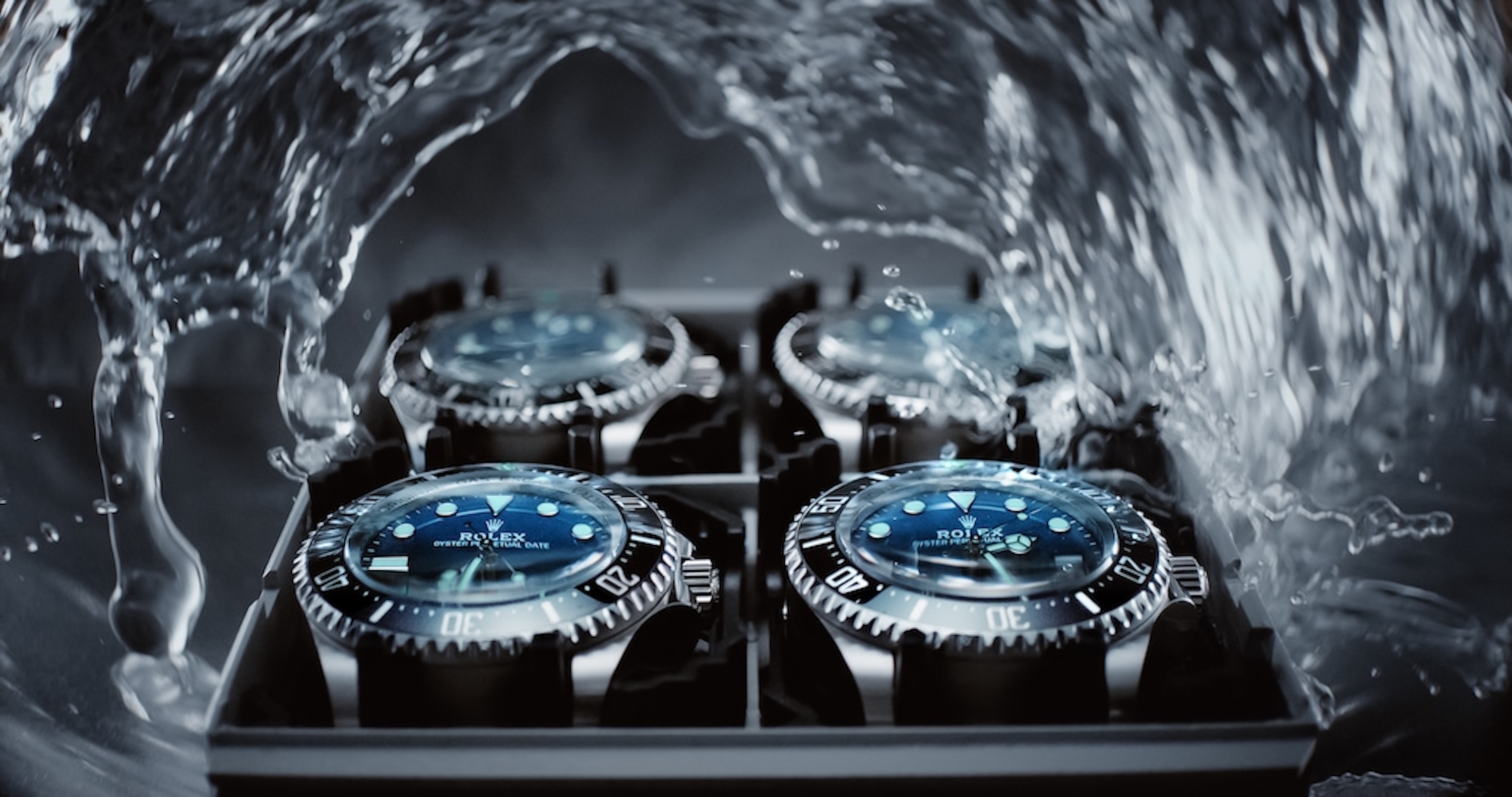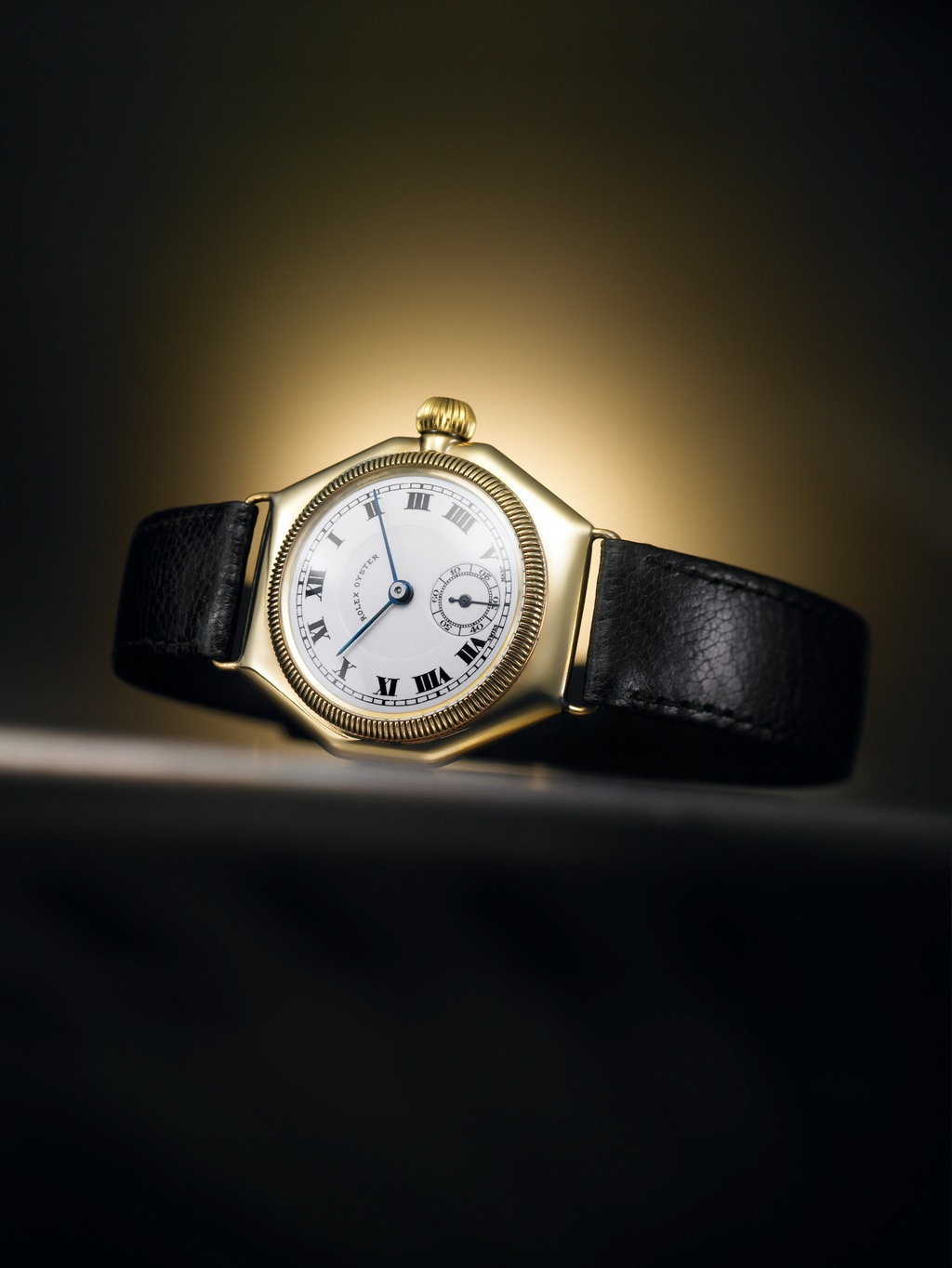In the world of waterproof watchmaking, Rolex remains peerless. The Swiss watch manufacture created the world’s first waterproof wristwatch almost a century ago, and has continued to cement its unmatched reputation by creating over the years underwater horological innovations such as Twinlock and Triplock winding crowns, the helium escape valve, and the Ringlock system (below).
Up until the early 20th Century, watch movements were vulnerable to dust, perspiration, water and humidity — contaminants that could all too easily enter the case, clogging the delicate movement, and often causing it to rust or degrade. The keyless winding mechanism invented in the mid-1800s did some good in remedying these issues, but watches remained highly susceptible to external threats.
In the years following the First World War, wristwatches overtook pocket watches as the gentleman’s default timekeeping device. Rolex founder Hans Wilsdorf was determined to bring to market a wrist-worn timepiece that could withstand the perils of day-to-day life, including exposure to water and dust, and that would be suitable to wear during outdoor pursuits such as horse-riding, driving early automobiles, swimming or sailing. Wilsdorf sought to develop a watch that was not only elegant and accurate but also, hardy and durable.
The Oyster, launched in 1926 is the worldʼs first waterproof wristwatch thanks to its hermetic Oyster case. Source: Rolex
In 1926, Rolex launched the ground-breaking Oyster. Inspired by the mollusc that its hermetically-sealed case resembled, the watch featured a screwed-down front and back, and a patented screw-down crown, a combination offering unprecedented waterproofness. In order to demonstrate the superlative ‘performance under pressure’ of the Oyster watch, Wilsdorf arranged for it to be performance-tested by British swimmer Mercedes Gleitze, who wore the watch while swimming the English Channel in 1927.

Gleitze was the sixth person and the first woman to successfully swim the channel. After her perilous 15-hour journey from France’s Cap Gris-Nez to the English shore at Dover, Gleitze emerged from the chilly seas with her Rolex wristwatch functioning perfectly. The Oyster’s powers of imperviousness had been put to the test and came through with flying colours.

As early as the 1930s, Rolex had begun to equip expeditions to the Himalayas in a bid to observe how its watches would behave in the extreme conditions at high altitude. After every trip, the climbers gave feedback on how the watches had performed, which enabled the brand to make improvements for future models. Just as a watch’s movement is propelled by the motions of the wearer, so watchmaking techniques advanced thanks to the explorers’ experiences, and Rolex timepieces have gone on to accompany many more voyages of discovery to the remotest areas of our planet. The watchmaker would continue to rigorously trial its timepieces in challenging real-world scenarios in the years to come
In the 1960s, British sailor Sir Francis Chichester wore a Rolex Oyster Perpetual on his 226-day solo circumnavigation of the globe. When he returned to Rolex for servicing at the conclusion of Chichester’s epic journey, the watch was found to be in perfect working order. “Excellent waterproofing, normal amplitude balance… The movement is clean and in good condition,” read its service report.

The brand’s waterproof diver’s watch, the Oyster Perpetual Submariner with its Twinlock screw-down crown, was released in 1953, immediately finding favour with military servicemen, swimmers, divers and sailors. Today, the Submariner has became an iconic timepiece whose renown now extends beyond the professional world it was first designed for.
Related
The New Rolex Oyster Perpetual Submariner and Submariner Date
Rolex has updated the Submariner and Submariner Date, both now in a slightly larger 41 mm case. : Read Story
Inspired by the rich heritage that has bound Rolex to the world of yachting since the 1950s and after many years of development, the contemporary Yacht-Master officially launched in 1992, followed in 2007 by the Yacht-Master II, a regatta chronograph tailored to professional yachtsman.

Today, the Yacht-Master II is put through its paces on the world’s waterways by numerous sailors, including world champion yachtsman and Rolex Testimonee, Paul Cayard (above). However, before it leaves the brand’s manufacture, each and every watch bearing the Rolex crown is subjected to an exacting series of tests to ensure its incomparable resistance to water and other environmental threats.
First, every movement is submitted to Swiss Official Chronometer Testing Institute (COSC) for certification, undergoing 15 days and nights of tests in various positions and at a range of temperatures. Testing continues in-house after the watches are assembled at the Rolex manufacture. Following a series of initial assessments — including visual inspections, checks for any manufacturing defects, ensuring that all components are properly fitted and sealed — the watches are subjected to an air pressure test that will identify any vulnerabilities in the seals.

Next the watch is immersed in water, in hyperbaric tanks simulating conditions 10-25 percent beyond the guaranteed waterproofness depth of each model. In watches such as the Sea-Dweller and Deepsea, which possess a helium escape valve (an innovation developed and patented by Rolex in 1967, below), this functionality is tested, ensuring that trapped helium gas molecules are able to be safely released from the watch case in a controlled manner.
Related
Conquering The Depths of the Ocean with the Epitome of Rolex Watchmaking
How Rolex has met the demands of human exploration of the ocean with cutting-edge diving technology, from the Oyster Perpetual Submariner, Sea-Dweller to the depth-defying Rolex Deepsea.: Read Story

Related
The new Rolex Oyster Perpetual Deepsea Challenge – Up to 11,000 metres waterproof
This NEW divers’ watch is waterproof up to 11,000 metres (36,090 feet), dwarfing the Rolex Deepsea, which presented in 2008, can resist the pressure exerted at 3,900 metres (12,800 feet).: Read Story
Rolex then performs additional checks to measure the watch’s resistance to the potentially damaging effects of shocks, temperature variations, and magnetic fields. Timekeeping, of course, is strictly evaluated, so that every Rolex watch meets the criteria of its ‘Superlative Chronometer Officially Certified’ designation.
In one of the final stages of quality control assessment, watches are grouped in sets of ten for a thorough day-long accuracy test. A photograph is taken of each watch, and exactly 24 hours later, another photograph is captured. When the images are overlaid, the hand positions need to be aligned perfectly, in order for the watch to pass the grade.
Guaranteeing supreme accuracy and imperviousness to environmental threats, only timepieces that have passed these battery of tests and inspections are allowed to leave the Manufacture’s workshops.
Rolex can therefore offer its customers watches with a superlative level of performance that pushes back the limits of mechanical timepieces and makes the brand a benchmark of watchmaking excellence.
Credit: Source link
